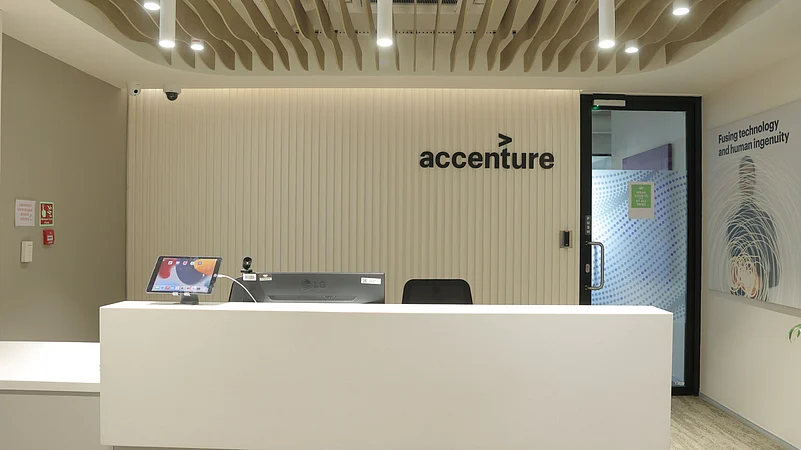
Accenture posted 7% revenue growth last year but issued a cautious outlook for FY26.
The IT giant guided for 2%-5% growth amid weak discretionary spending and challenging macro conditions.
The company faced headcount cuts, federal project cancellations in the US, and slow AI adoption in FY25.
Analysts view the results as neutral for Indian IT, citing near-term volatility but highlighting AI as a long-term tailwind.
Ireland-based IT giant Accenture on Thursday provided a cautious outlook for the financial year 2025-26 (FY26), while reporting 7% year-on-year revenue growth for the previous year. The company expects discretionary spending to remain flat or potentially deteriorate further between September 2025 and August 2026.
This has constrained its revenue growth guidance to a 2-5% range, similar to what many Indian IT giants had forecast for their businesses earlier this year. Meanwhile, management commentary also highlighted challenges faced last year, including headcount reduction, project cuts in the US driven by Department of Government Efficiency (DOGE) and the need to convince hesitant clients to invest in AI capabilities.
"We grew 7% last year, adding $5 billion in revenue with over $80 billion in bookings, and we did so against a macroeconomic backdrop that did not improve over FY24," said CEO Julie Sweet at the start of the earnings call. She explained that in FY25, the Dublin-based company had to build on the "rapid shift" in its business to navigate "challenging market conditions."
Analysts at Nuvama view Accenture’s results as neutral for Indian IT. "We expect the sector to remain volatile in the near term, impacted by weak and uncertain macro conditions," the brokerage said in a note on Friday, adding that over the medium to long term, a recovery in the macro environment would accelerate enterprise tech spending.
JM Financial shared a similar view, noting that the sector is facing "multiple (perceived) concerns."
CLSA, however, said Thursday's results signify "a stable demand environment," highlighting Accenture’s AI bookings as an "incremental tailwind to business if companies have invested well in advance."
Accenture's earnings are often seen as a bellwether for the IT sector. Next month, Indian IT giants such as TCS (October 10), Infosys and Wipro (both October 17) are set to announce their second-quarter results.
Slower Growth, Job Cuts
For the full fiscal of FY25, Accenture's revenue grew to $69.7 billion, up 7% year-on-year. Its managed services business, which is similar to outsourcing offered by Indian companies, grew by 9%, while consulting grew by 5.8%.
The firm's Q4 revenue, which was up just 4.5% year-on-year, was impacted by US federal contract cuts. Several contracts for IT consulting and services offered by the likes of Accenture, Capgemini and others were paused during the early months of 2025. Elon Musk-led DOGE reportedly cancelled many of them or put them on pause for review in order to cut government spending.
Accenture says without these impacts it would have grown 6% YoY in Q4. In FY26 as well, it expects a 1-1.5% headwind from these pauses and reviews.
Sweet told analysts that while they are seeing some pick-up in procurement, "it's still slower than it has been in the past."
Meanwhile, Accenture’s Americas revenue rose 5% YoY in constant currency (8% excluding the US Federal business), led by banking, capital markets, industrials, and software. EMEA grew 3% YoY, supported by insurance, life sciences, and consumer sectors, while Asia Pacific rose 6% YoY on strength in banking and public services.
New bookings grew 6% YoY, with 37 new clients above $100 million in Q4, and 305 diamond clients in FY25, with most large deals spanning multiple services. Total deal booking for the year was $21.3 billion.
Nuvama notes that out of Accenture's 2-5% FY26 guidance, about 1.5% is expected to come from inorganic growth. The company aims to invest $3 billion in FY26 compared to just $1.5 billion worth of acquisitions in FY25. Point to note: in FY25, inorganic growth was 3%.
This comes as both consulting and outsourcing are growing in low-to-mid single digits. The company guided for an adjusted operating margin of 15.7–15.9% and Q1 revenue growth of 1–5% YoY in constant currency.
One impact of this is a sequential workforce decline of 11,419 by the end of the fourth quarter, falling from 790,692 in May 2025 to 779,273 in August 2025. On an annual basis, the company’s workforce declined by about 1%.
This reduction was attributed to a six-month "business optimisation program," under which Accenture "rotated talent" and divested two acquisitions that "no longer align with strategic priorities." These actions cost $615 million in Q4 FY25 and are expected to cost an additional $250 million in the ongoing quarter.
Though management expects hiring to pick up across all regions in FY26, Accenture said it will continue reskilling programs and hiring in priority areas to maintain service quality.
AI Deal Rise, Hesitancy Remain
The Dublin-based company is one of the few IT players reporting detailed AI earnings. In this quarter, it has shifted from calling these earnings "GenAI" to "Advanced AI." The company said its advanced AI project bookings nearly doubled in FY25 to $5.9 billion. The number of projects deploying AI has also expanded sharply, from just a handful in 2023 to 6,000, while revenue rose from negligible levels to $2.7 billion.
"These numbers only reflect revenue and bookings specifically related to advanced AI, which is Gen AI, agentic AI and physical AI, and do not include data, classical AI or AI used in delivery of our services. We're now going to use the term advanced AI as it encompasses the latest developments that are starting to gain traction," she explained.
However, when asked how their clients are seeing the technology, she explained that while "advanced AI has taken the mind share of CEOs, the C-suite and boards" faster, "value realisation has been underwhelming for many and enterprise adoption at scale is slow, other than with digital natives.”
Outlook Business has earlier reported that IT sector clients are expected to pause massive spending on AI due to the rapid development of the technology, which has overwhelmed many of them. Further, those still spending will be asking companies to provide clear outcomes from the investment.
Further, many analysts see the technology as disinflationary as productivity gains from AI would have to be passed on to enterprises, which would reduce some IT earnings.
Though Accenture’s CEO told analysts otherwise.
"We don't see AI as deflationary. We do see and are seeing it as expansionary similar to every tech evolution we've been through. The move from analog to digital, from on-prem to cloud and SaaS, and as many of you who have been with us over the course of the years have known, in every successive tech evolution, we've become stronger," Sweet said.
In light of this, the company claims to have trained over 77,000 professionals in AI skills. But those they can't train, Sweet said, will be exited from the company in a "very compressed timeline."

































